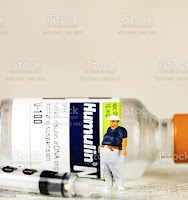Diabetes n Obesity
Sugar upsets microbiome, takes out insurance against heftiness and diabetes
An investigation of mice found that dietary sugar modifies the stomach microbiome, setting off a chain of occasions that prompts metabolic infection, pre-diabetes, and weight gain
The discoveries, distributed today in Cell, propose that diet matters, however an ideal microbiome is similarly significant for the avoidance of metabolic condition, diabetes, and corpulence.
Diet adjusts microbiome
A Western-style high-fat, high-sugar diet can prompt weight, metabolic disorder, and diabetes, yet how the eating regimen launches unfortunate changes in the body is obscure.
The stomach microbiome is vital for a creature's nourishment, so Ivalyo Ivanov, PhD, academic partner of microbial science and immunology at Columbia University Vagelos College of Physicians and Surgeons, and his associates explored the underlying impacts of the Western-style diet on the microbiome of mice.
Following a month on the eating regimen, the creatures showed qualities of metabolic condition, for example, weight gain, insulin opposition, and glucose bigotry. Also, their microbiomes had changed emphatically, with how much fragmented filamentous microorganisms - - normal in the stomach microbiota of rodents, fish, and chickens - - falling forcefully and different microscopic organisms expanding in overflow.
Microbiome changes modify Th17 cells
The decrease in filamentous microbes, the analysts found, was basic to the creatures' wellbeing through its impact on Th17 resistant cells. The drop in filamentous microscopic organisms diminished the quantity of Th17 cells in the stomach, and further trials uncovered that the Th17 cells are important to forestall metabolic illness, diabetes, and weight gain.
"These safe cells produce atoms that log jam the assimilation of 'awful' lipids from the digestive organs and they decline gastrointestinal irritation," Ivanov says. "At the end of the day, they hold the stomach solid and shield the body back from engrossing pathogenic lipids."
Sugar versus fat
Which part of the great fat, high-sugar diet prompted these changes? Ivanov's group observed that sugar was at fault.
"Sugar takes out the filamentous microorganisms, and the defensive Th17 cells vanish as a result," says Ivanov. "At the point when we took care of mice a without sugar, high-fat eating regimen, they hold the gastrointestinal Th17 cells and were totally shielded from creating stoutness and pre-diabetes, despite the fact that they ate similar number of calories."
Be that as it may, wiping out sugar didn't help all mice. Among those coming up short on any filamentous microorganisms regardless, disposal of sugar didn't make a useful difference, and the creatures became large and created diabetes.
"This proposes that a few well known dietary mediations, for example, limiting sugars, may just work in individuals who have specific bacterial populaces inside their microbiota," Ivanov says.
In those cases, certain probiotics may be useful. In Ivanov's mice, enhancements of filamentous microorganisms prompted the recuperation of Th17 cells and security against metabolic disorder, regardless of the creatures' utilization of a high-fat eating routine.
However individuals don't have similar filamentous microbes as mice, Ivanov believes that different microscopic organisms in individuals might make similar defensive impacts.
Giving Th17 cells to the mice additionally gave assurance and may likewise be remedial for individuals. "Microbiota are significant, yet the genuine insurance comes from the Th17 cells initiated by the microscopic organisms," Ivanov says.
"Our review underlines that a perplexing collaboration between diet, microbiota, and the resistant framework assumes a vital part in the improvement of stoutness, metabolic disorder, type 2 diabetes, and different circumstances," Ivanov says. "It proposes that for ideal wellbeing it is significant not exclusively to change your eating regimen yet in addition work on your microbiome or gastrointestinal resistant framework, for instance, by expanding Th17 cell-actuating microorganisms."




Comments
Post a Comment